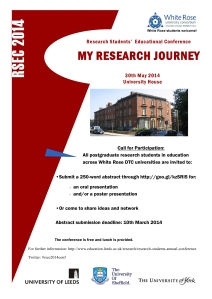| 09:30-10:00 | Registration, Tea and Coffee | |
| 10:00-10:15 | Welcome Address
Dr. Paula Clarke (PGRT) and Regan Holden (UG intern) |
|
| 10:15-11:35 | Oral presentations 1a | Oral presentations 1b |
| Academic Chair: Professor John Monaghan
Committee Chair: Geoffrey Nsanja · Herri Mulyono: When the data do not meet the statistical assumptions: Some tips · Xiaoyin Yang: Mobile devices supporting international students to overcome language and culture difficulties during study abroad · Irfan Rifai: A dilemma of employing online sources and photographs: ethical and practical issues · Ibtissam Al-Farah: Women and Education: A case study of IFAD’s Educational Programmes for Women in Yemen |
Academic Chair: Dr. Mary Chambers
Committee Chair: Loreto Aliaga-Salas · Aparna Gummadi: A study of nutrition education in early years settings in England · Ghada Alhudaithi: Teachers’ attitudes towards the inclusion of children with autism in Saudi Arabian mainstream classrooms · Maria Doukanari: Attention Deficit Hyperactivity Disorder (ADHD) – The case of Cyprus · Katie Gathercole: Using Adobe Connect to overcome issues of researcher proximity when interviewing children and young people |
|
| 11:35-11:55 | Coffee/Tea Break and Poster Viewing | |
| 11:55-12:55 | Oral presentations 2a | Oral presentations 2b |
| Academic Chair: Dr. Martin Lamb
Committee Chair: Chung Gilliland · Jessica Bradley: Can I sit next to you? Partnership working in applied linguistics research · Rumana Hossain: Returnee Professionals Experience in Higher Educational Context: Digging In or Digging Out… · Jin A Kim: Critical thinking in academic writing |
Academic Chair: Dr. Martin Wedell
Committee Chair: Arwa Gandeel · Khawla Badwan: Whose Language and Why? Reflections on Dealing with Bilingual Interview Data · Melike Bulut: Reflections on the Use of Stimulated Recall Interviews in a Teacher Education Context · Tasnima Aktar: Orchestrating Listening Strategies: Methodological Concerns |
|
| 12:55-13:55 | Lunch and Poster Viewing | |
| 13:55-14:55 | Oral presentations 3a | Oral presentations 3b |
| Academic Chair: Dr. Jean Conteh
Committee Chair: Rumana Hossain · Samyia Ambreen: Interviewing primary school children informally in an ethnographic research · Nasir Mahmood: Misrecognition of intersectional performance of gender, religion and education in lives of adult British Pakistanis in educational and social contexts. · Nordiana Zakir: Bruneian Preschool Teachers and The Transformation of Early Childhood Landscape in Brunei Darussalam: A Case Study |
Academic Chair: Professor Alice Deignan
Committee Chair: Tasnima Aktar · Arwa Gandeel: Using interviews to explore teacher beliefs: the role of the researcher · Gisela Oliveira: Writing to Remember: The role of field notes in starting and developing the data analysis process |
|
| 14.55-15.40 | Round table discussion 1: | Round table discussion 2: |
| Planning fieldwork, carrying out data generation, early stage of analysis.
Academic Contributors: Jean Conteh Paula Clarke Mary Chambers |
Data analysis, write up and discussion of findings.
Academic Contributors: Matt Homer Alice Deignan Judith Hanks |
|
| 15:40-16:00 | Coffee/Tea Break and Poster Viewing | |
| 16:00-16:45 | Keynote Address by Professor Stephen Gorard | |
| 16:45-17:15 | Wine Reception (soft drinks available) | |
Posters:
- Mukrim Thamrin: Collaborative action research as a means of professional development for English teachers in secondary school in Indonesia
- Paulette Dougnac Quintana: University – Community Engagement: The case of an anchor University in Chile
- Tasnima Aktar: Listening Strategies and Good Listeners: a pilot study
- Arwa Gandeel: ‘I believe they can speak!’:Teachers’ beliefs and practices and the teaching of speaking


 conceptualising your research, and presenting a clear and cogent reasoning for it, is part of being a postgraduate research student. This is a great opportunity to practise the skill of doing this verbally in front of a friendly audience of your peers.
conceptualising your research, and presenting a clear and cogent reasoning for it, is part of being a postgraduate research student. This is a great opportunity to practise the skill of doing this verbally in front of a friendly audience of your peers.